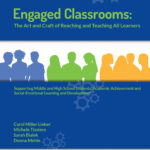The holistic development of adolescents – academically, socially, and emotionally – is at the heart of the Engaged Classrooms approach. It is informed by three key frameworks:
- Equity-Centered Classrooms emphasize culturally responsive and developmentally informed practices and close opportunity gaps and academic and disciplinary disparities among student groups.
- Multi-Tiered Systems of Supports provide a scaffolded approach for teachers to reach and engage diverse groups of learners through the implementation of universal promotion and prevention practices for all students, and teacher-facilitated interventions for students who struggle academically and/or behaviorally.
- Learning & Life Competencies guide integration of academic, social, and emotional learning and development into daily classroom practices.
Engaged Classrooms prepares teachers and staff to create schools where adolescents feel safe, cared for, engaged, and challenged. The approach is organized within five Domains: 1) Positive Personal Relationships; 2) Organizing the Learning Environment; 3) Content Design, Learning Tasks, and Protocols; 4) Academic Support; and 5) Restorative and Accountable Discipline and Behavioral Support.
Our Engaged Classrooms service offers multiple pathways for increasing academic engagement and strengthening social and emotional learning for every student, and for creating learning environments that are safe, nurturing, and caring:
The Diagnostic
A comprehensive process in which Engaging Schools collaborates with school leaders to assess current instructional practices regarding student engagement and achievement. It includes a review of quantitative data, sensing interviews, classroom observations, a teacher survey, and school leader meetings.
Engaged Classrooms Institute
A three-day, in-person, immersion experience that supports secondary teachers to reflect on their current practices. They learn frameworks, strategies, and mindsets that increase engagement, build high-performing classroom communities, improve academic achievement, and foster social and emotional competencies.
Engaged Classrooms Virtual Professional Learning Series
Online sessions that enhance teachers’ capacity to reach and engage every student. Teachers experience and explore a set of classroom management, instruction, and discipline strategies that translate easily to the in-person environment.
Guided Discipline Institute
A three-day, interactive, in-person experience focusing on classroom management and discipline strategies that strengthen students’ self-awareness, self-management, and social and academic efficacy.
Guided Discipline Virtual Professional Learning Series
Online sessions that enhance teachers’ experience in creating classrooms that strengthen students’ social and emotional skillfulness.
The Professional Learning Cycle
This process equips teacher teams and instructional leaders to address a collectively identified “problem of practice.” The Professional Learning Cycle is customized to each school’s context and provides sustained professional learning that helps teachers plan for solutions that improve student outcomes. A train-the-trainer version is available.
For a downloadable PDF of graphics connected to the Engaged Classrooms approach, please click here.
Resources
A compelling set of evidence-based strategies provides the foundation of the Engaged Classrooms approach. You can find these and much more in our latest publication, Engaged Classrooms: The Art and Craft of Reaching and Teaching All Learners. Please click here for a sample chapter from the book on “Positive Personal Relationships.”
Engaged Classrooms helps teachers deepen their ability to:
- Foster and sustain positive personal relationships with and among students
- Organize the classroom environment to support readiness to learn
- Ramp up rigor to increase academic engagement
- Integrate academic support into daily lessons to enable all students to meet proficiency standards and achieve their personal best
- Plan for, respond to, and manage unwanted behaviors
Engaged Classrooms fosters positive changes in student outcomes.
Students have increases in:
- Attendance
- Perceptions of trust, belonging, and safety
- Self-awareness, self-management, social and academic efficacy
- Course completions and GPA’s (after ongoing and consistent implementation over several years)
Students have decreases in:
- Lost instructional time due to in-school and out-of-school suspensions
- Disproportional application of referrals, in-school, and out-of-school suspensions
Engaged Classrooms helps schools gain:
- Enhanced leadership capacity to coach and support teachers in the areas of instruction, classroom management, and discipline
- A consistent and coherent set of classroom strategies that align with commonly used teacher effectiveness frameworks and that can be readily used within teacher evaluation systems
- Increased teacher efficacy and commitment to the craft of teaching
- Increased collaboration with and between teachers and instructional leaders to ramp up engagement and achievement
- Empowered teachers who hold a set of optimistic mindsets about instructional decisions and methods
- Equity-centered classrooms that are culturally responsive and developmentally informed

“Educators need to understand how best to help adolescents develop as learners in their classes. This should not be framed as an additional task for teachers, though for many it may mean teaching in new ways. By helping students develop the noncognitive skills, strategies, attitudes, and behaviors that are the hallmarks of effective learners, teachers can improve student learning and course performance while also increasing the likelihood that students will be successful in college.”
Camille A. Farrington, et al., Teaching adolescents to become learners, The role of noncognitive factors in shaping school performance: A critical literature review


 Engaged Classrooms: The Art and Craft of Reaching and Teaching All Learners
Engaged Classrooms: The Art and Craft of Reaching and Teaching All Learners  Activators: Classroom Strategies for Engaging Middle and High School Students
Activators: Classroom Strategies for Engaging Middle and High School Students